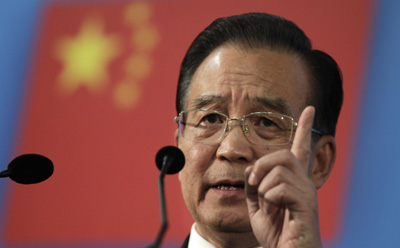Today, members of China’s Communist Party Central Committee met in Beijing to open a three-day discussion on the country’s next five-year development plan. And while they’re unlikely to openly debate a recent letter by 23 senior Party members, which called for sweeping reforms of China’s media censorship policies, it will certainly be in the air.
Though much of the news of the Nobel Prize going to Liu Xiaobo was suppressed in China’s public media, Central Committee members have privileged access to foreign news and are well aware of the award.
On Friday, through an online letter called “On Liu Xiaobo and the Nobel Peace Prize,” more than 100 Chinese scholars, activists and lawyers called for democratic reforms, along with the release of Liu and other political prisoners. “We are urging measures to be taken as soon as possible so that Liu Xiaobo be freed, that he be reunited with his wife Liu Xia and that he go to Oslo himself to receive the prize,” the online letter’s authors wrote. Access to the letter is blocked within China, of course.
Put this in the context of comments made by Premier Wen Jiabao. In an interview with CNN on October 3, which is still blacked out in China, he said, “democracy and freedom will become irresistible.” He made similar comments in an August speech, linking political reform with economic progress.
One of the complaints in the letter from the 23 Party elders was that censors had taken it upon themselves to suppress Wen’s comments. And though the Chinese media largely ignored Wen’s earlier comments, Keith Richburg reports in the Washington Post that Wen’s recent comments made the front pages of the nation’s more liberal outlets: the Modern Express in Jiangsu province, the Xiaoxiang Morning Post in Hunan Province, the Beijing News and China Youth Daily.
“Southern Weekend, one of the most outspoken weekly newspapers in Guangdong province, came out Thursday with a large front-page photo of the Time cover featuring Wen, alongside Wen’s comments from the TIME/CNN interview about the need for political reform,” Richburg reported Friday from Beijing.
This isn’t the first time that China’s press has dared to flout the censors. In the past, however, these efforts have usually been met with tougher media restrictions from the Central Propaganda Department, as it is called in Chinese. (The official title in English? Central Publicity Department.)
It would be unduly optimistic to hope Chinese officials will ease restrictions on the press anytime soon, let alone this weekend. But as the Central Committee focuses on economic issues and the five-year plan, its members would do well to remember Wen’s pronouncement from this summer, his suggestion that economic development and political progress are intertwined. If China is truly committed to making political progress, a free and open media will be essential.
